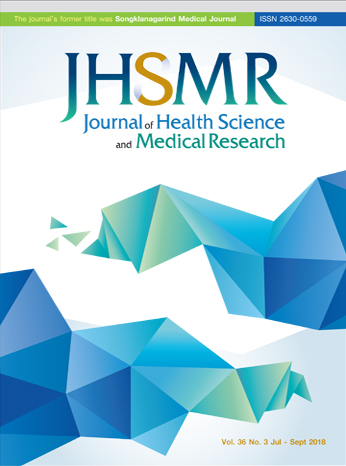Delirium Tremens in Psychiatric Ward at Songklanagarind Hospital
DOI:
https://doi.org/10.31584/jhsmr.2018.36.3.17Keywords:
alcohol, delirium tremens, red blood cell, withdrawal syndromeAbstract
Objectives: To examine the epidemiology of delirium tremens patients in the psychiatric ward at Songklanagarind
Hospital and to find factors associated with the disease.
Material and Methods: This was a cross-sectional study that collected data from alcohol dependent patients who were admitted in the psychiatric ward at Songklanagarind Hospital between January 2011 and December 2014. Descriptive statistics were used to analyze the data and logistic regression analysis used to analyze factors associated with the disease.
Results: The prevalence of delirium tremens in psychiatric ward was 28.0%. The study found that body temperature >37.8 °C (p-value=0.026), eosinophils >6.0% (p-value=0.046), hematocrit <40.0% (p-value<0.001), red blood cells <4.5x106/ul (p-value<0.001), MCV <83 or >97 g/dl (p-value<0.001), MCH <27 or >33 pg (p-value<0.001), platelets <150x103/ul (p-value<0.001), magnesium <16 mg/dl (p-value=0.043), zinc <0.7 mg/dl) (p-value=0.029), total bilirubin >1 mg/dl (p-value= 0.039) and direct bilirubin >0.2 mg/dl (p-value=0.036) were significant factors correlated with delirium tremens. Multiple logistic regression models found that only red blood cell count <4.5x106/ul (p-value<0.001) was a significant factor correlated with delirium tremens.
Conclusions: The prevalence of delirium tremens in this study was lower than in other Asian countries. Red blood cell count <4.5x106/ul (p-value<0.001) was correlated with delirium tremens.
References
2.Lee JH, Jang MK, Lee JY, Kim SM, Kim KH, Park JY, et al. Clinical predictors for delirium tremens in alcohol dependence. J Gastroenterol Hepatol 2005;20:1833-7.
3.Burapakajornpong N, Maneeton B, Srisurapanont M. Pattern and risk factors of alcohol withdrawal delirium. J Med Assoc Thai 2011;94:991-7.
4.Phongthanya S, Sanichwannakul K, Wanmanee S, Manosri M, Pumprisanchai V, Ruengorn C. Pharmacotherapy of alcohol withdrawal in patients admitted to Suanprung Hospital. Chiang Mai: Chiang Mai University; 2010.
5.Lerner WD, Fallon HJ. The alcohol withdrawal syndrome. N Engl J Med 1985;313:951-2.
6.Amato L, Minozzi S, Vecchi S, Davoli M. Benzodiazepines for alcohol withdrawal. Cochrane Database of Systematic Reviews [serial on the Internet]. 2010 Mar [cited 2017 Nov 11]. Available from: https://onlinelibrary.wiley.com/doi/10.1002/14651858.CD005063.pub3/full
7.Ferguson JA, Suelzer CJ, Eckert GJ, Zhou XH, Dittus RS. Risk factors for delirium tremens development. J Gen Intern Med 1996;11:410-4.
8.Mayo-Smith MF, Beecher LH, Fischer TL, Gorelick DA, Guillaume JL, Hill A, et al. Management of alcohol withdrawal delirium. Arch Intern Med 2004;164:1405-12.
9.Fiellin DA, O’Connor PG, Holmboe ES, Horwitz RI. Risk for delirium tremens in patients with alcohol withdrawal syndrome. Subst Abus 2002;23:83-94.
10.Lee JH, Jang MK, Lee JY, Kim SM, Kim KH, Park JY, et al. Clinical predictors for delirium tremens in alcohol dependence. J Gastroenterol Hepatol 2005;20:1833-7.
11.Berggren U, Fahlke C, Berglund KJ, Blennow K, Zetterberg H, Balldin J. Thrombocytopenia in early alcohol withdrawal is associated with development of delirium tremens or seizures. Alcohol Alcohol 2009;44:382-6.
12.Eyer F, Schuster T, Felgenhauer N, Pfab R, Strubel T, Saugel B, et al. Risk assessment of moderate to severe alcohol withdrawal-predictors for seizures and delirium tremens in the course of withdrawal. Alcohol Alcohol 2011;46:427-33.
13.Fink R, Hutton R. Changes in the blood platelets of alcoholics during alcohol withdrawal. J Clin Pathol 1983;36:337-40.
14.Ignjatovic-Ristic D, Rancic N, Novokmet S, Jankovic S, Stefanovic S. Risk factors for lethal outcome in patients with delirium tremens-psychiatrist’s perspective: a nested casecontrol study. Ann Gen Psychiatry 2013;12:39.
15.Bogden J, Trolano R. Plasma calcium, copper, magnesium and zinc concentrations in patients with alcohol withdrawal syndrome. Clin Chem 1978;24:1553-6.
16.Monte R, Rabanal R, Casariego E, Bal M, Pertega S. Risk factors for delirium tremens in patients with alcohol withdrawal syndrome in hospital setting. Eur J Intern Med 2009;20:690-4.
17.Goodson CM, Clark BJ, Douglas IS. Predictors of severe alcohol withdrawal syndrome: a systematic review and metaanalysis. Alcohol Clin Exp Res 2014;38:2664-77.
18.Harshe DG, Thadasare H, Karia SB, Sousa AD, Cholera RM, Kale S, et al. A study of patterns of platelet counts in alcohol withdrawal. Indian J Psychol Med 2017;39:441-4.
19.Lee SY, Park HJ, Best-Popescu C, Jang S, Park YK. The effects of ethanol on the morphological and biochemical properties of individual human red blood cells. PloS one [serial on the Internet]. 2015 Dec [cited 2017 Nov 11]; 12(10). Available from: https://journals.plos.org/plosone/article?id=10.1371/journal.pone.0145327
20.Bulle S, Reddy VD, Padmavathi P, Maturu P, Puvvada PK, Nallanchakravarthula V. Association between alcohol-induced erythrocytes membrane alterations and hemolysis in chronic alcoholics. J Clin Biochem Nutr 2017;60:63-9.
























